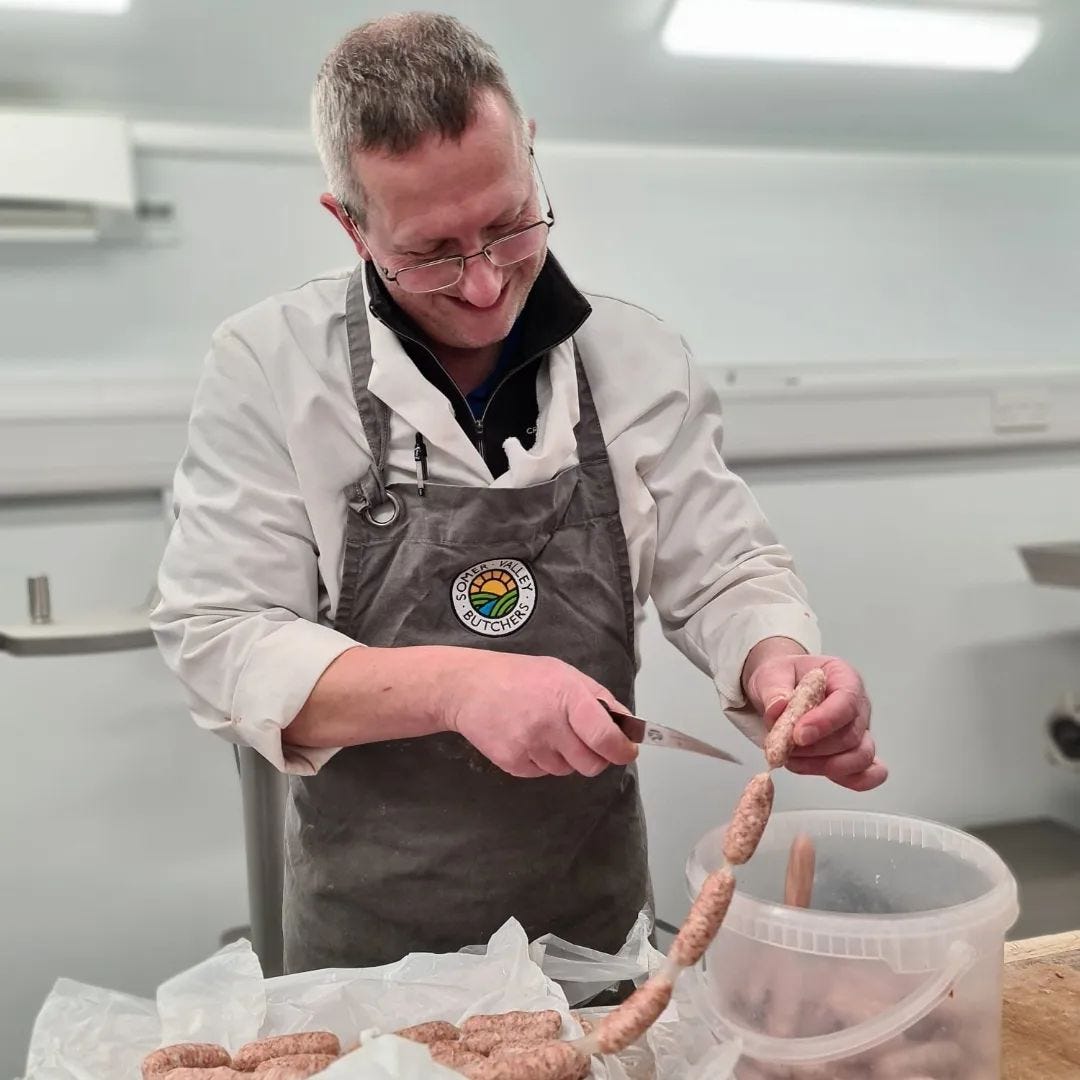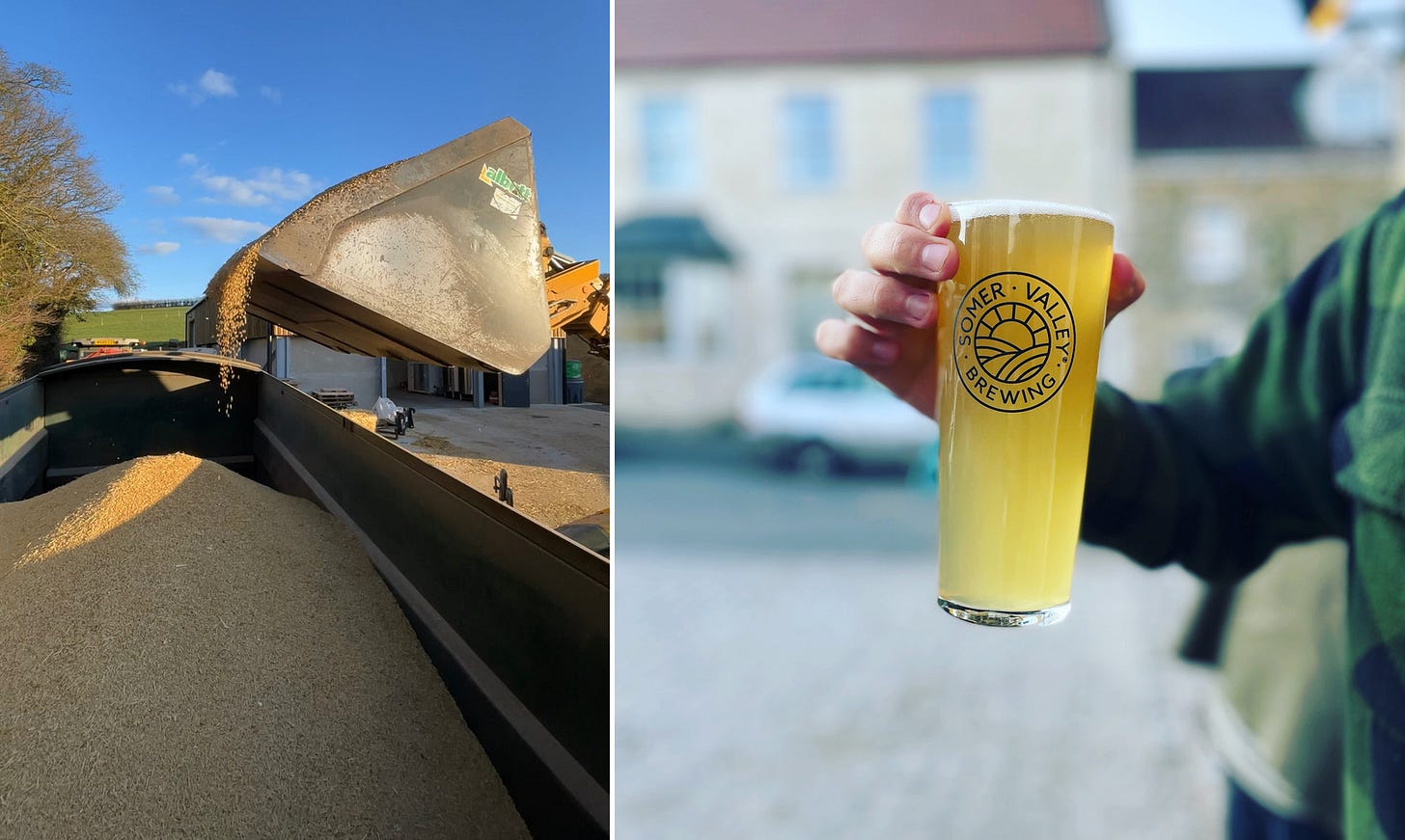The 'grain to glass' philosophy of Somerset's newest brewery [WFJ #65]
Beer in the UK rarely exhibits such reverence to locality
It’s pretty simple actually. Hops, malt, water, and yeast – the four foundations for any beer you happen to choose, no matter if it’s a traditional English bitter, a Foster’s Lager, or a mangoey New England pale ale.
Perhaps because of their distinctive fruity characteristics, and enchanting aromas, hops receive the most rep. But malt is, without question, a far more important constituent – it’s where a beer gets its sweetness, alcohol, body, and colour.
This is not lost on Somer Valley Farms in Peasedown, who’re doing the rare thing of growing their own barley to make the malt for their newly-released beers – Brook, a 4.7% helles lager, and Rolling Hills, a 4.2% session pale ale.1
“The whole idea behind Somer Valley Farms is reconnecting local people with local produce,” Chester Ellis, Somer Valley’s brewer, tells The WFJ. “So the way we've done that in the brewery is by planting five acres of our own barley.”
Those five acres, planted in October 2021, helped harvest 25 tons of Craft barley in August the year after. Over the winter the grain dried in storage at the farm, before heading off half an hour down the A362 and onto Warminster Maltings to be converted from barley to malt. “We've got quite a good relationship with those guys,” says Chester. “They’re absolutely awesome.”
This might not be an overstatement – Warminster Maltings, which has been around since 1855, is the oldest of its kind in the country, and one of the few go-to traditional maltsters for craft brewers, wherever they are in the world.2 No good malt can be made from bad barley, is what they say. Which in Somer Valley’s case isn’t something they’ve had to worry about.
“We've had it kilned to 2.1 EBC,” Chester says, referring to the scale that measures colour of malts, and by extension, their flavour and richness. “It's an incredibly low number that’s given us a really nice, very light, extra pale malt. Which we can then layer in other malts on top of to create what we want.”

At least to start with, that’s meant a helles lager and pale ale, cuckoo brewed (which is to say, brewed at another brewery and on their kit) at On Point Brew Co in Bedminster while Somer Valley build their own brewery back on the farm. The helles, hopped with Hallertau, consists of 80% Somer Valley malt, with 15% wheat malt and 5% Vienna malt. “What I've done there,” says Chester, “is use our own malt for that nice light colour, layered in with some wheat for a bit of extra body, and then a little kiss of Vienna at the end, which is gonna give you a bit more of a biscuity kinda thing.”
Rolling Hills pale uses a similar ratio of Somer Valley malt, with wheat and oats for a fuller body. Hop-wise, Centennial provides a little bitterness, with El Dorado and Motueka offering up their tropical, citrusy flavours and aromas on top. “I wanted to make an accessible beer,” Chester says. “I want bitter drinkers to be able to actually enjoy that sort of a beer on a hot day and not be completely turned away by how hoppy it is.”
In April, both beers had their first pour, which occurred at The Fox & Badger pub in Wellow (an event Chester says “could not have gone better”), and have since appeared on the taps at The White Hart and Walcot House, both in Bath.

It’s a promising sight. Not just for the brewery, but – I don’t think it’s unfair to say – the industry as a whole. Because, whether through inflation, the cost of living, or secondary effects of Covid, a disconcerting number of UK breweries have folded, or are on the precipice of folding, in 2023 already.
And so, with the helles and pale an instant hit, there’s reason to think Somer Valley’s USP is on the money. Is it, though, enough to give them an appetite for eventually doing more or less the whole thing themselves – hop-growing, in-house yeast cultivation, et al?
“In-house yeast strains are something I'll definitely look to do over the next few years,” says Chester, though he’s much less sure about the local conditions and the clayey soil’s conduciveness to a decent hop yield. “But,” he adds, “you never know.”
Chester is hoping to soon put on a tasting of Rolling Hills and Brook in Frome. If you’d like to attend, reply to this email and I’ll keep you in the loop.
While several other UK breweries ‘grow’ their own barley, the mostly do so by contracting out the work to local farms – doing it yourself, like in this case, is a different story
For that, and for being so local, Warminster Maltings will have its own dedicated WFJ issue in due course





Their Bolt pale ale is outrageously nice.
Their Bolt pale ale is outrageously nice.